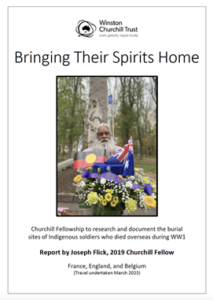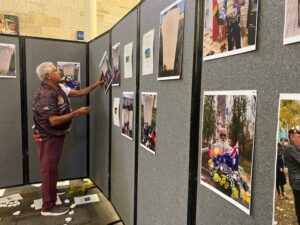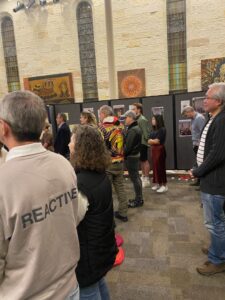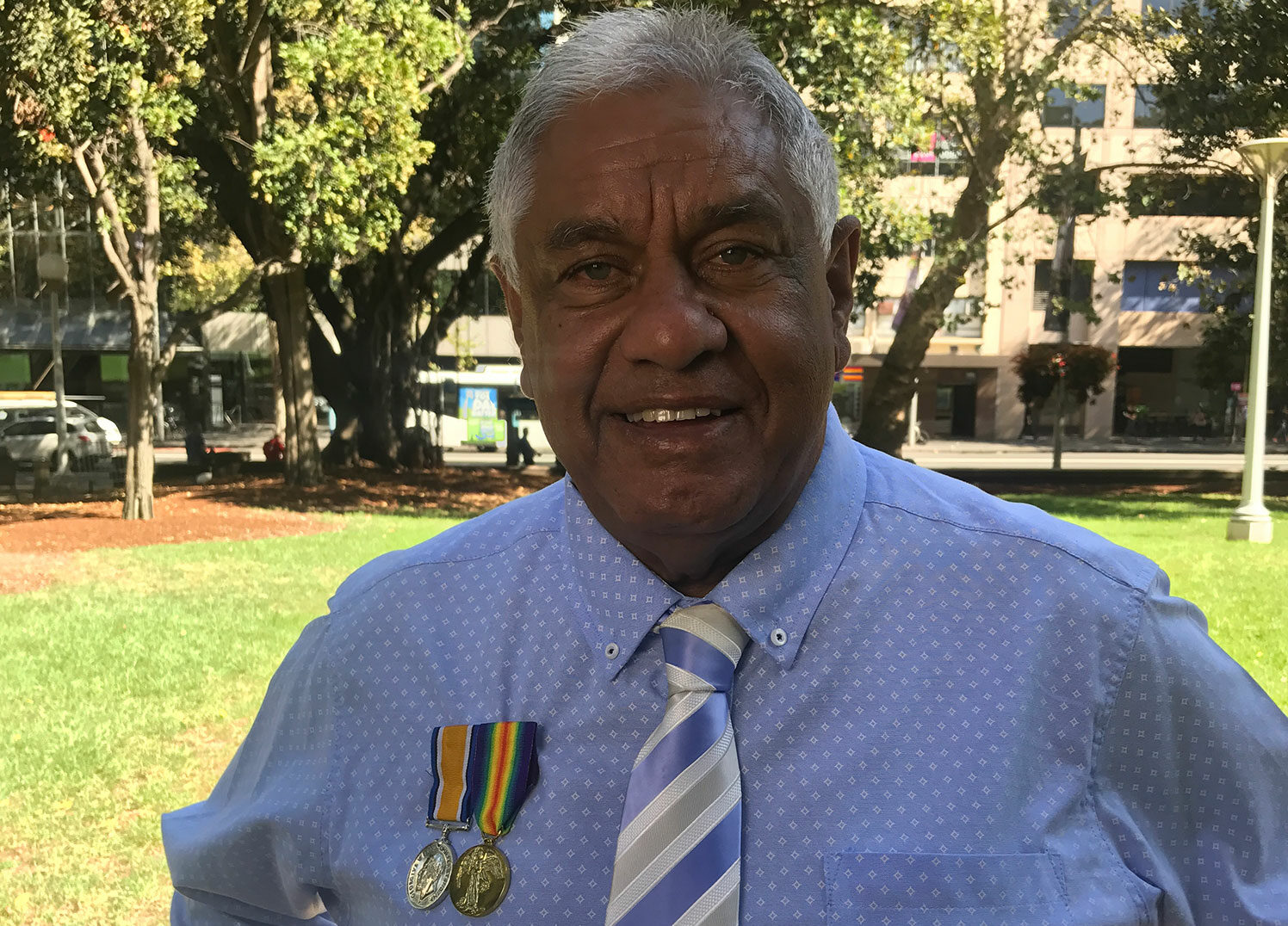This Anzac Day is an important day for our nation to reflect upon the brave people who gave up their lives in war, to fight for peace. Churchill Fellows have over the years completed Fellowships in topics related to war history, commemoration, and to support to Veterans. Some of these Churchill Fellows are further below.
One Churchill Fellow, Joseph (Joe) Flick, honours the brave Indigenous men who gave their lives defending the country that denied them citizenship. Joe has been publicly sharing his photo displays, including a Coloured Digger March and display this Anzac Day at Redfern. Next week Joe heads to France to help make a new Netflix documentary.
Anzac Day
Anzac Day is the anniversary of the day when Australian and New Zealand soldiers landed in Gallipoli in 1915 as part of the Allies’ invasion. While most Australian soldiers were honoured, it is important to reflect upon those Indigenous soldiers who at that time were not given the same recognition.
Joe’s reflections
“Hundreds of Aboriginal soldiers upon returning from war were ignored, their children denied school, denied soldier settlement land blocks, and soldiers even denied entry to the RSL and told to ‘go around the back and we’ll hand you a beer.” said Joe.
Joe is a Dubbo local, and proud Gomeroi/Yullaroi man originally from Collerenebri. His mother and grandmother were part of our stolen generation, and his grandfather fought in World War 1.
Joe’s Churchill Fellowship took him to France, England and Belgium where he identified 91 Aboriginal soldiers who died in battle, later of their wounds or disease, and was able to locate the graves of 68 of these soldiers.
Joe spoke of his Churchill Fellowship: “It was an emotional trip. Standing in front of the graves of these young men, from Cape Barren Island, and from some of the Aboriginal missions in NSW and VIC,”
“It is a little known fact that more than 1200 Aboriginal men enlisted in WW1. Without them, and without all of our Australian solders, we wouldn’t have the freedom we have today,”
Joe conducted a small ceremony at each of the found 68 graves. He draped the Aboriginal flag across each of the headstones during the ceremony, laid flowers and left both an Aboriginal and an Australian Flag at the grave.
“I told them that their Mob loved them, and their Mob know where they are. I know a lot of their people won’t get to visit those cemeteries,”
“It was really hard to perform those little ceremonies,”
Where details were known, Joe read names and acknowledged family details as well as playing the clapsticks to honour the too few years these young men lived. The playing of clapsticks is a means of returning a spirit to Country, family and the Dreamtime. Each ceremony was finished with a recitation of the Ode of Rememberance and playing of the Last Post. Joe also commemorated the men who have no known graves but whose names are commemorated on Memorial rolls.
“When Aboriginal solders came home, they were treated differently. My grandfather, he wasn’t allowed into the RSL to celebrate Anzac Day. He was told to ‘go around the back and they would hand him a beer. These stories aren’t known or talked about. When my grandfather came home, his kids weren’t allowed to go to school – not until 1947. The majority of Aboriginal soldiers weren’t provided with soldier settlement land blocks either,”
Joe’s work to locate the graves was achieved through years of work by a number of researchers, families and Michael Bell, the Aboriginal Liaison Officer at the Australian War Memorial. Joe also thanks Marg Powell, Des Crump, Philippa Scarlett, and also the Commonwealth War Graves Commission for providing the names of the soldiers and the location of their final resting places.
“Because it’s such an emotional subject, I do become emotional,” said Joe.
Joe designed his Churchill Fellowship to research, document and record the resting place of Aboriginal World War I soldiers. His Fellowship not only brings an understanding – both to the general Australian public and internationally – of the role played by Aboriginal people in the defence of the Commonwealth but more importantly a sense of closure to these soldier’s family, friends and loved ones.
“Joe’s Churchill Fellowship and his ongoing important work honours these brave soldiers, to ensure their sacrifice is not forgotten.” said Rachael Coghlan, CEO of the Winston Churchill Trust.
Joe has described his Churchill Fellowship report as a ‘living document’, inviting collaboration and hoping that his work to remember these lost soldiers is continued.

Joe’s Fellowship is an effort to engage with the Australian Government and people, but most importantly, Joe has completed this Fellowship for the descendants of the selfless men and women who sacrificed themselves for our freedom and peace. Joseph states that his Fellowship is “another phase of the identification, commemoration and awareness of the significant role played by Aboriginal people in defence of Australia in World War I.”
Joe is headed to France next week with Dylan Nicholls who is producing a Netflix documentary with a descendent of William Allan Irwin. Together they will trace William Allan Irwin’s descendent to visit his final resting place at Doaurs Cemetery in France. To follow this journey go to Facebook ‘Remembering Aboriginal and Torres Strait Islanders of World War 1’
Joe has recently launched a new photo display open for public viewing in Redfern on Anzac Day where he will be speaking, and Joe is open to new opportunities to fund more wider viewing of the photo display.

 .
. 

Read Joe’s report here.
